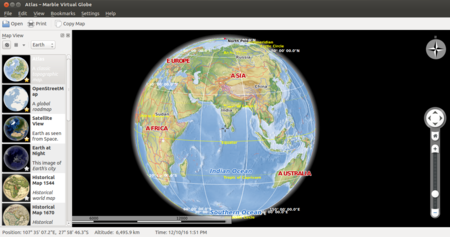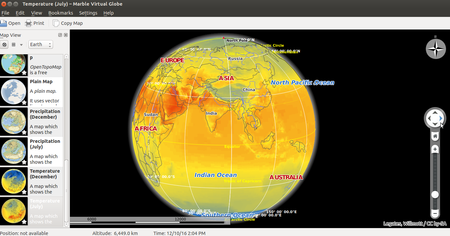Learn Marble
Introduction
ICT Competency
Subject (Geography) resource creation.
Educational application and relevance
Atlas is an essential resource for a Geography teacher. An atlas is required to learn political geography as well as physical geography. Marble is a digital atlas. It can be used to understand and analyse map information of the Earth. Lessons can be created using different maps from Marble to understand certain concepts in geography.
Version
Marble Virtual Globe Version 1.8.3 (stable release) (Marble is also available on the Windows and Macintosh operating systems)
Configuration
This tool has no specific configuration requirements
Overview of Features
Marble is an virtual atlas, it has many digital maps of the Earth. These maps provide information about physical geography of the Earth, including topography, rainfall, climate etc. It also has ‘historical’ maps which give the information about the Earth at various points in time in the past, relating to political regimes at that time
Other similar applications
Other free digital atlas applications include K Geography Non free digital atlas includes https://www.google.com/earth (Google), Bhuvan http://bhuvan.nrsc.gov.in/bhuvan_links.php (ISRO).
Development and community help
- User manual for Marble is available on http://docs.kde.org/development/en/kdeedu/marble and https://docs.kde.org/trunk5/en/kdeedu/marble/index.html
- Community support is available on https://marble.kde.org/support.php
Working with the application
Functionalities
Overview of the Marble tool Marble is part of the Ubuntu distribution. This can be opened from Applications → Education → Marble.
 Image Image
|
 Image Image
|
| Step I On the left side you will see many maps one below the other. Selecting any of them, will open it fully on the right side. You can use your mouse to move the Earth in all ways – top to bottom and bottom to top, right to left and left to right. You can click on the map at any place to expand it – this is ‘drilling down’ the map. You can also use the scale bar at the right to increase/reduce the map size and change its orientation. |
Step II Open the “Temperature July” map. You can study the temperature patterns across the Earth during July on this map. Colour conventions have been used to suggest the temperature during this month. Open each of the maps available in the application.
|
| Image Image Image Image (Step 3) | Image Image Image Image (Step 4) |
| Texttexttexttexttext Texttexttexttexttext Texttexttexttexttext Texttexttexttexttext Texttexttexttexttext Texttexttexttexttext Texttexttexttexttext Texttexttexttexttext Texttexttexttexttext Texttexttexttexttext | Texttexttexttexttext Texttexttexttexttext Texttexttexttexttext Texttexttexttexttext Texttexttexttexttext Texttexttexttexttext Texttexttexttexttext Texttexttexttexttext Texttexttexttexttext Texttexttexttexttext |
File formats for creation
Saving the file
Marble does not have its own file format, which you can create, edit and save. However you can export images of the maps you are working on. See ‘export and publishing files’ section
Export and publishing files
You can create an image file from Marble through the File – Export option.
Advanced features
Installation
| Method of installation | Steps |
|---|---|
| From Ubuntu software Centre | Steps |
| From Terminal | Steps |
| From the web | Steps |
| Web based registration | Steps |
The application on mobiles and tablets
Marble is not available on mobiles and tablets. There are apps for Android, for physical and political geography of the Earth
Ideas for resource creation
You can create information for analysing in select topics in Geography. Students can explore the maps for different topics such as 1. Rainfall patterns in July and December in India (corresponding to South west and North East monsoons), rainshadow regions, and explore causes for different rainfall patterns 2. Latitudes and longitudes, the role of each and differences between the two